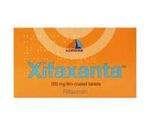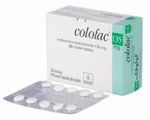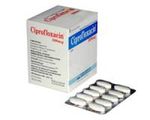Diarrhoea is not a disease, but a symptom. Everybody has had diarrhoea before. Most of the time, diarrhoea will go away by itself. If diarrhoea does not go away by itself or if it has caused so much fluid loss that it is accompanied by dehydration, it is important to take medical action.

Diarrhea
Treatments
- All treatments
- Prescription medicines
- Non-prescription medicines
- Relevance
- Name A-Z
- Name Z-A
- Price low-high
- Price high-low
How does Dokteronline work?
At Dokteronline, you can get expert advice from doctors quickly, without the hassle of visiting your GP’s surgery. Take care of your health with reliable treatments and information from the comfort of your home.
Select your preferred treatment
The doctor will review your medical request
The pharmacy will ensure your medication is delivered to your doorstep
What is diarrhea?
In case of diarrhoea, the defecation pattern is (severely) disturbed. Diarrhoea is a water-thin stool often several times a day. Diarrhoea can be acute and is usually caused by an intestinal infection and therefore usually disappears after a few days. If it persists for more than 2 weeks we call it chronic diarrhoea, and in this case the infected may have a disease.
What are the causes of diarrhea?
The causes of diarrhoea may be:
- Abrupt intestinal infection: in case of acute diarrhoea, diarrhoea is usually caused by a virus, parasite or bacteria. This also includes what is popularly known as the stomach flu, which is caused by a virus and is contagious. An infection by bacteria is often caused by contaminated food or water. Contaminated food may include raw chicken or pork, raw milk and milk products, egg and egg products, fish and shrimps. An infection by a parasite can be caused by contaminated food or water. Sometimes it is not clear how the infection is caused.
- Stress: digestion is not sufficient due to stress. Not enough water and minerals are removed from the food remains, the stool goes faster through the intestines and remains watery.
- Medication: antibiotics can cause diarrhoea. Antibiotics are used to combat pathogenic bacteria, but they can also damage good bacteria in the intestine and thus confuse the intestinal flora. A commonly used medicine for diabetic metformin can also cause diarrhoea. A thyroid that is set too high (when the thyroid function is too low) can also cause diarrhoea.
- Food intolerance: when certain foods are not tolerated, we speak of food intolerance. Examples include lactose intolerance (milk and milk products) and celiac disease, which is a gluten intolerance.
- Accelerated metabolism: a thyroid gland that works too fast causes too fast a metabolism. One of the manifestations of this could be diarrhoea.
- Disease of the gastrointestinal tract: Crohn's disease (a chronic inflammatory disease of the intestine) and ulcerative colitis (in which there is a chronic inflammation of the colon) cause diarrhoea, especially when these diseases flare up. A greasy thin stool is seen in chronic diseases of the liver, bile ducts and pancreas.
- Irritable Bowel Syndrome (IBS): this condition can be accompanied by diarrhoea. The diarrhoea can also be interspersed with constipation. When no cause for diarrhoea is found, chronic diarrhoea is often classified as such.
- Raging diarrhoea: in case of constipation, the stool thickens. Thin stools go past the blockage. People think they have diarrhoea when they actually have a blockage. This is also called paradoxical diarrhoea.
- Food: certain ingredients accelerate the speed of digestion. This is known from replacing sugars such as mannitol, fructose, sorbitol and xylitol that can be found in foods, soft drinks (fructose), sweets and chewing gum.
- Traveller's diarrhoea: traveller's diarrhoea is defined as diarrhoea that can occur when travelling to countries, especially far away from home, where hygiene conditions are impaired.
How do you recognise diarrhea?
With diarrhoea you can suffer from the following symptoms:
- Watery thin stools
- The faeces have a sour smell
- Bowel movements several times a day
- Stomach cramps
- Difficulty in keeping in faeces
- Possibly nausea and vomiting as well
- Generally do not feel good up to feeling sick
- Feel weak, this can be accompanied by headaches
- As you lose a lot of fluid in your faeces, there is less fluid to urinate from
- Sometimes fever
Can I do something myself about diarrhea?
If you have diarrhoea you can take the following measures.
- Drink a lot: in case of acute diarrhoea, you lose a lot of fluids, this fluid needs to be replenished with salty and sugary drinks, such as broth or tea with sugar, not a soft drink. Drink small amounts. Even if you think that the moisture is coming out right away, drink small amounts to prevent dehydration.
- Eat: try to eat. In principle, you can eat anything, preferably fibre-rich food. The fibres will thicken the stool.
- Hygiene: make sure you have good hygiene. Wash your hands after going to the bathroom or preparing food.
- Adjust medication: talk to your doctor if you suspect that your medication is causing diarrhoea, do not stop your medication yourself.
What are the forms of treatment?
The treatment of diarrhoea depends on the cause of the diarrhoea. Acute diarrhoea does not need to be treated immediately, it usually disappears within a few days. It is important to prevent or counteract dehydration phenomena.
Medication
Read the package leaflet for each medicine you are taking.
- ORS (oral rehydration solution): in case of dehydration symptoms, ORS can be prescribed (it is also available without a prescription). It is a mixture in powder form or in effervescent tablet of salts and dextrose. The medicine must be dissolved in water. To do this, use clean water, if necessary, still mineral water. Every time you have watery thin stools or vomiting, you take a solution from ORS. If you do not manage to drink it all at once, take a small sip regularly throughout the day. With ORS, people with a low sodium diet or people with diabetes should be aware of the amount of salt and sugars in ORS. If the vomiting is not over with this medicine after a day, consult a doctor. If the diarrhoea is not over after 3 days, consult a doctor.
- Loperamide (oxide): Loperamide (oxide) can be a practical solution. For example, if you need to travel or have something important that you really need to attend to. The diarrhoea stops in principle within a few hours and this works for 4 to 6 hours. Loperamide inhibits the movements of the intestines and also pulls the anus together, so you feel less pressure. The stool stays in the body for longer and thus has the possibility to thicken. If the diarrhoea has not stopped after 2 days, consult your doctor. If you no longer have diarrhoea, stop the medication at least after 12 hours. Loperamide can cause constipation. Consult your doctor if you experience severe abdominal pain.
- Azithromycin and ORS: in case of severe infectious diarrhoea in which the bacterium is not yet known, azithromycin and ORS can be chosen. Often the doctor will also want a faecal examination to find out which bacterium causes the diarrhoea. If this is known, another antibiotic can be chosen if necessary.
Alternative treatments
There are no known alternative treatments for diarrhoea. Previously, activated carbon (norit) was used, but there are no indications that it helps.
Lifestyle changes
Depending on the severity of the cause of your diarrhoea, there are several ways to make some changes to your lifestyle. Maintaining a healthy lifestyle is always good, but in case of gastrointestinal tract disease it is essential to reduce or even prevent the symptoms. A healthy lifestyle means living as healthily and regularly as possible with a varied diet. Sufficient sleep, avoid stress, move regularly and do not smoke. Moderate consumption or stop the consumption of alcohol. In case of a food intolerance such as lactose and gluten intolerance, it is advisable to stop consuming foods containing these products. At first, it means looking at the food packaging to see what is inside, but you will see that you get some dexterity in it. When you go out to dinner, indicate in advance that you have a gluten-free or lactose-free diet.
Additional risks and side effects
A major risk of diarrhoea is dehydration. Dehydration is a serious situation and can be accompanied by the following symptoms:
- Little or no urination and dark urine
- Thirst
- Dry mouth
- Lethargy
- Fainting
- Confusion
- Drowsiness
- Rapid breathing
- Rapid heartbeat
- Sunken eyes
- Cold arms and legs
Depending on the severity of the symptoms, you should consult a doctor. Diarrhoea is associated with a lot of fluid loss, some medication may need to be adjusted, otherwise the body will ingest too much of the product. For some substances, this can have negative consequences. The following medications may and always need to be adapted in consultation with a doctor:
- Potassium-lowering medicines, tablets and hypertension medication
- Phosphate binders
- Insulin and certain pills in diabetics
- Laxide, stop with the product until the diarrhoea and/or vomiting is over again
- The pill
How can you prevent diarrhea?
Read under "Lifestyle changes" how to prevent or reduce diarrhoea in case of gastrointestinal tract diseases and food intolerance. Diarrhoea with acute intestinal infections can be prevented by taking the following measures. Wash your hands after every visit to the toilet. Wash your hands before preparing food. Always fry chicken and pork well. Also when barbecuing. For meat, fish, pre-cut vegetables, chilled meals and fresh fruit juices, please note the expiry date. After this date, you must dispose of the products, otherwise bacteria may grow in them. These products should be kept cool at 4°C, so in the refrigerator. Meats, eggs, soft cheese, milk and milk products and pastries must also be kept refrigerated. They have a best before date, after this date they are perishable. So do not go too far beyond the best before date before consuming these products. If you want to keep your own food, let it cool down before you put it in the fridge. Calculate the expiry date for your own frozen products and put it on, do not use the products after that date. Regularly clean your refrigerator. Do not thaw meat on the sink, a microwave is much better or in the refrigerator in a covered dish. Put products that can spoil quickly back in the refrigerator.
Follow the advice below to prevent traveller's diarrhoea. You can get traveller's diarrhoea in countries with reduced hygienic conditions. Therefore, ask whether water from the tap can be used to drink, prepare food and brush teeth. Do not drink drinks with ice cubes. Only consume pre-packed ice creams. Do not eat unpeeled fruit, raw vegetables or salads. Be careful with the food you buy on the street (market stalls). Keep food cooled and covered. Only eat well cooked meat and fish. Be careful when swimming in stagnant water. Ask if vaccinations are recommended or even mandatory. As a precaution, take ORS with you.
Sources
References
Foundation for intestinal health. (z.d.). What is the cause of diarrhoea? Consulted on 27 April 2019 at https://www.darmgezondheid.nl/darmklachten/darmaandoeningen/diarree/
Foundation for intestinal health. (z.d.). What is the cause of diarrhoea? Consulted on 27 April 2019 at https://www.darmgezondheid.nl/darmklachten/darmaandoeningen/diarree/
Harm, G., Kerskes, M., NVN Developers’ Guideline. (6 April 2018). Adjusting medicines. Consulted on 27 April 2019 at https://www.nieren.nl/bibliotheek/83-oppassen-met-medicijnen/309-medicijngebruik-als-u-diarree-hebt-of-moet-overgeven
Nutritional center. (z.d.). What helps with diarrhoea? Consulted on 27 April 2019 at https://www.voedingscentrum.nl/encyclopedie/diarree.aspx
Nutritional center. (z.d.). Expiry date (THT/TGT). Consulted on 27 April 2019 at https://www.voedingscentrum.nl/encyclopedie/houdbaarheidsdatum-tht-tgt-.aspx
Pharmacotherapeutic compass. (z.d.). Diarree/treatment flame. Consulted on 27 April 2019 at https://www.farmacotherapeutischkompas.nl/bladeren/indicatieteksten/acute_diarree
Stomach liver bowel foundation. (z.d.). Crohn’s disease. Consulted on 27 April 2019 at https://www.mlds.nl/chronische-ziekten/crohn-ziekte-van/leven-met-de-ziekte-van-crohn/
Stomach liver bowel foundation. (z.d.). Ulcerative colitis. Consulted on 27 April 2019 at https://www.mlds.nl/chronische-ziekten/colitis-ulcerosa/hoe-de-ziekte-ontstaat/
Stomach liver bowel foundation. (z.d.). Complaints and symptoms of diarrhoea. Consulted on 27 April 2019 at https://www.mlds.nl/klachten/diarree/?gclid=Cj0KCQjw5J_mBRDVARIsAGqGLZCG4NpAjFzYip7YrEZ5yhq9O60iTANIWOihgMUDYbavBBV6JRtoCQwaAmQBEALw_wcB#klachten-en-symptomen
Thuisarts.nl. (z.d.). I have diarrhoea in short. Consulted on 27 April 2019 on https://www.thuisarts.nl/diarree/ik-heb-diarree


